
Happy 2016 in review! It is now a tradition for us to take a moment this time of year to give thanks for everyone’s contributions and debrief a little on studio happenings.
As always, Tiltfactor is buzzing with many of games and projects. We’re currently crafting two games to promote bystander intervention and combat sexual assault on college campuses with our collaborators at the University of New HampshirePrevention Innovations Research Center. We have three compelling new prototypes in the works as part of our National Science Foundation funded project to make interactive narratives for students in introductory college science, technology, engineering, and mathematics (STEM) courses. And we continue to concoct games to combat climate change–recent data collected is showing definite shifts in thinking, which is excellent news! This past year we’ve studied digital and analog reading, we published on the efficacy of digital and non-digital versions of a public health game, and finished up our work with Metadata Games, creating a lightweight app for everyone to use for their own archiving. We also continue to hone our effective design methodology and shared this in our new essay in BBMK: Intersectional Perspectives and Inclusive Designs in Gaming. It’s been a very exciting year and we’re doing great things. Read on for more information on these projects and more!
I’d like to extend Tilt’s collective gratitude to our fans, friends, collaborators, players, supporters and sympathizers out there… In these contentious political times, we hope our work–games that combat biases and stereotypes, research that explores equity and health, games that empower women and help communities rise–ultimately brings people together. In our view, this work is needed now more than ever. Thanks for being a part of it!
Mary Flanagan
Fairchild Distinguished Professor in Digital Humanities, Professor of Film and Media Studies, and Tiltfactor’s founder / director, located at Dartmouth College
New Games and Apps
The Tiltfactor team has been working on many new projects. I’m proud to announce that we will release 2 new digital experiences this year: a browser-based crowdsourcing game called Crowded Dungeon, and, with the National Archives, a mobile phone app called r-kive.
Crowded Dungeon
Crowded Dungeon is a web game that at first seems like a traditional ‘dungeon crawl’-style game. The player directs a hero through many rooms of a very crowded dungeon, frequently encountering monsters that bar her way. Unlike traditional games, instead of fighting the monsters, players must talk their way past the monsters; you’ll need to figure out what each monster wants, and figure out what you can type to them to convince them to let you pass. Team member Sukie explains, “Unlike other text-based adventure games, which rely on a finite number of pre-scripted responses to specific phrases that the players type, players in Crowded Dungeon can type anything and receive a response. The game is freeform and dynamic; it uses a crowdsourcing process to collect monster responses and then provide the hero with a seemingly infinite number of options for getting through the dungeon.” Tiltfactor is on the cutting edge of investigating crowdsourcing, so I’m proud to continue this tradition with Crowded Dungeon. Best of all it can be re-skinned and be used a research tool. Expect to be able to play this game starting later this month!

A player tries to sweet-talk a troll into letting her pass in Crowded Dungeon
r-kive
As the crowning jewel in our multi-year Metadata Games project supported by the National Endowment for the Humanities Office of Digital Humanities, Tiltfactor partnered with the U.S. National Archives to create the mobile app r-kive (pronounced the same as ‘archive’), which allows people to search and label personal photos on their phones. In between tagging and organizing their own images, you’ll occasionally tag images from the National Archives and share this information back to the national database to help make these images discoverable by the public. r-kive helps you organize your own photos (and keep your own data and images local and secure) and simultaneously contribute to the preservation of national records. r-kive will be available before the end of the year for iOS and Android devices!
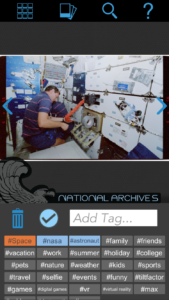
Tagging a National Archive image of NASA in r-kive
Metadata Games Success
Crowdsourcing for libraries and archives really works. We’ve now finalized our work on Metadata Games, funded by the by the National Endowment for the Humanities Office of Digital Humanities, and very proud of it. The system served 45 Collections at 11 Institutions, generated hundreds of thousands of tags, and led to partnerships with the Holocaust Museum, the British Library, the National Archives, University of Edinburgh, and many more prominent institutions and collections. During the project, we created and tested 10 front end games for browser and mobile, including those that carry video: Zen Tag, NexTag, Guess What!, One Up, Pyramid Tag, Stupid Robot, Ships Tag*, Book Tag*, Portrait Tag*, Sort It!, and more. We conducted 5 research studies looking at data quality and motivation to contribute to crowdsourcing, including ways to frame crowdsourcing tasks, as altruistic or not, and motivation dependent on timing and feedback in games.
New Research
On the research front, important work continues on biases, stereotypes, women in STEM, the digital experience and cognition. As always, you can keep up with all of our research and read all of our papers on our website.
New Researcher
This spring Dr. Gili Freedman joined the Tiltfactor team as our postdoctoral researcher! She’s already doing great things in the lab, and you should look forward to more fascinating research studies from Gili and Tiltfactor in the coming year.
Digital vs. Nondigital Reading
Our CHI paper published this spring, “High-Low Split: Divergent Cognitive Construal Levels Triggered by Digital and Non-digital Platforms”, presented our study on the effects of reading on a screen. The finding–that reading on a tablet or computer screen resulted in participants looking at smaller details and concrete points, as opposed to the big picture–was covered widely in the media, from outlets such as Huffington Post to Psychology Today, ABC News, the Washington Post, and dozens of others. This study was a resounding reminder of the potential Tiltfactor’s work has to impact people and the choices they make in their daily lives. This important work was supported by the Neukom Institute at Dartmouth.
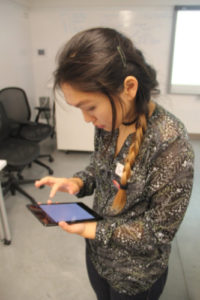
Digital vs. Nondigital Games
Related to our CHI paper, we also published a paper in the proceedings of the Digital Games Research Association (DiGRA) 2016 conference entitled “Playing the System: Comparing the Efficacy and Impact of Digital and Non-Digital Versions of a Collaborative Strategy Game.” In this paper we investigated the differences between our POX app and our POX: Save the People collaborative board game. Both games were built to encourage players to vaccinate themselves and their children, but the difference between being on an iPad or on a table made a huge difference in the games’ impact! Read the whole paper here.
Meaningful Play
Tiltfactor took the the podium this October at the 2016 Meaningful Play Conference. Our team presented two papers, one on Tiltfactor’s climate change prototype games and their effects on people’s environmental attitudes and sustainable behaviors, and one on the challenges inherent in the game design process when designing for crowdsourcing.
Here’s an excerpt from the paper we presented about climate change games: “Although climate change is increasingly seen as an imminent global threat, there is a lack of research on how people’s behaviors and attitudes can be altered to improve the environment (Swim et al., 2010; van der Linden, Maibach, & Leiserowitz, 2015). The present paper provides two examples of how games can be used as interventions to foster environmentally sustainable attitudes and behaviors. Both games show promise for game designers and psychologists interested in harnessing the power of games to improve the environment by increasing sustainable attitudes and behaviors.” Find the paper on the Meaningful Play website, here. This important work was supported by the Neukom Institute at Dartmouth.

An upcoming prototype card game at the Meaningful Play 2016 conference
Here’s an excerpt of the nifty new paper we presented about designing crowdsourcing games: “In recent work (Seidman, Flanagan, Rose-Sandler & Lichtenberg, 2016), we outline the algorithms and processes by which we verify player’s responses in crowdsourcing games, and are able to determine accurate responses. This paper investigates design aspects, and in particular, how the feedback problem in the creation of crowdsourcing games can be effectively addressed. We illustrate this concept using the design of the document transcription game Smorball (2015), winner of the Boston Festival of Indie Games’ Best Serious Game award, as a case study.” You can find the paper on the Meaningful Play website, here. The development of Smorball was supported by the Institute for Museum and Library Services and the Biodiversity Heritage Library.
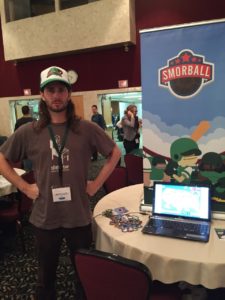
Team member Max with Smorball at Meaningful Play 2016
Human Computation
Gili presented a poster on feedback and timing in crowdsourcing games at the Human Computation conference. “The present research examines two problems inherent to the creation of crowdsourcing games: how to give feedback when the right answer is not always known by the game and how much time to give players without sacrificing data quality. Taken together, the present research provides an important first step in considering how to create fun, challenging crowdsourcing games that generate quality data.” Learn more about the poster here. This work was supported by the NEH.
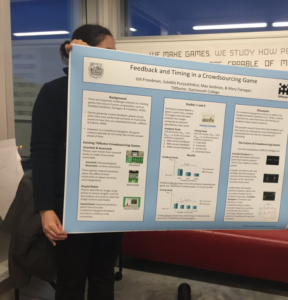
Gili hides behind the poster she brought to the Human Computation conference.
New Press
Here’s just some of the press coverage that we’ve received in the past year. For more, check out our press page.
Stein, Suzanne, and Sing, Prateeksha. “Gaming our way to understanding the barriers faced by women in tech.” The Globe and Mail, September 5, 2016.
Fenton, William. “How the Internet Affects What (and How) We Read” PCMag, May 19, 2016.
Devarajan, Sunjay R. “Reading on a Screen Rather Than Paper May Affect What You Learn, Study Shows” ABC News, May 12, 2016.
Krans, Brian. “Digital Reading Can Cause You to Miss the Big Picture” Healthline News, May 12, 2016.
Jacobs, Tom. “Why It’s Preferable to Read David Sedaris on Paper” The Pacific Standard, May 11, 2016.
Loftus, Tom. “The Morning Download: Pace of IT Job Growth and IT Spending Hit by Uncertainties “ The Wall Street Journal, May 10, 2016.
Toobin, Adam. “It’s Easier to Understand Nietzsche’s Writings on Paperback Than on an iPad, Study Finds” Inverse, May 9, 2016.
Peterson, Andrea. “Researchers Say Computer Screens Change How You Thinks About What You Read” The Washington Post, May 9, 2016.
Friedman, Lindsay. “Digital Media May Be Hindering Your Ability to Think Abstractly, Study Says” Fox News, May 9, 2016.
Craythorn, Barbara. “Tablets and Laptops Shorten Attention Spans” Doncaster Free Press, May 9, 2016.
Bergland, Christopher. “How Are Digital Devices Changing the Way We Think?”Psychology Today, May 9, 2016.
“Digital Media May Be Changing How You Think” Dartmouth College Press Release, May 8, 2016.
Recent Recognition
Business Learning Games
It’s so awkward! Our fun game Awkward Moment at Work, published by Resonym, was a finalist in the Business Learning Games Competition held in Dublin over the Thanksgiving holiday. Huzzah!
Monarch at PAX East, on TableTop with Wil Wheaton
The Monarch board game has had a great year! This past spring Monarch was a part of the Indie Megabooth at PAX East, and was chosen to appear on the board game show TableTop (with Wil Wheaton). The show, part of Season 4, is airing on the Alpha network now and will be released on YouTube in January. While neither of them aretechnically awards, we are very excited about the recognition from both. Last holiday it made the New York Times holiday games list so if you have not picked up a copy yet, you can visit your local Barnes and Noble or game store to get it! Buying from Barnes and Noble stores helps our team scaling the game to a mass audience.
Mary’s News
Games for Change Vanguard Award
This summer I was awarded the Vanguard Award from Games for Change! This award recognizes outstanding individuals who serve as advocates and mentors for a new generation of game creators. The Games for Change Festival organizers “… A leading innovator, artist, educator and designer, whose works have included everything from game-inspired art, to commercial games that shift people’s thinking about biases and stereotypes.” You can read more about the Vanguard Award atPaste Magazine.
Honorary Doctorate
This past May, I was awarded an Honorary Doctorate degree in design from the Illinois Institute of Technology. The degree honored my work’s focus on human values in design and research into gender in computing.
Exhibitions
My artwork is in two shows right now. One of my [mapscotch] pieces called Bomb Scotch is currently at the Push Play exhibition at the Johnson Design Center, The New School. My work Help Me Know the Truth is featured in the Monsters of the Machine exhibition at the LABoral Centro de Arte y Creación Industrial in Spain. In 2017 I will have a piece in the amazing HACKING / MODDING / REMIXING as Feminist Protest at CMU’s Miller Gallery.
Recent Essays
“An Alternate History of Wargaming.” Zones of Control: Perspectives on Wargaming.Pat Harrigan and Matthew Kirschenbaum, eds. MIT Press. 2016.
“Games as a Medium.” Debugging Game History: A Critical Lexicon. Eds. Raiford Guins and Henry Lowood. MIT Press. 2016.
“Game Art.” Debugging Game History: A Critical Lexicon. Eds. Raiford Guins and Henry Lowood. MIT Press. 2016.
“Critical Play: The Productive Paradox.” Blackwell Companion to Digital Art, ed. Christiane Paul. Wiley Blackwell, 2016.
“Critical Play and Responsible Design.” In production for The Routledge Companion to Media Studies and Digital Humanities. Ed. Jentery Sayers
Talks and Visits
Special visits this year included a keynote at the Oxford Internet Institute’s Connected Life conference, talks at the Berkeley Center for New Media’s History and Theory of New Media , Carnegie Mellon, Columbia University Teachers College, and at In and Out of Art History: The Video Game Conundrum. UK Association of Art Historians in the UK. I also gave two short talks as part of panels at the GDC Education Summit, “Teaching Analog Game Design” and “Who owns What and Why: Faculty and Student IP.” Next year, I will be speaking at the College Art Association and will also be a J. Paul Getty Museum Scholar/Artist, and a Senior Scholar in Residence at Cornell Society for the Humanities, among other lectures and visits. Huzzah!
Get Involved!
As we enter into this uncertain time in American history, social change is more important than ever. Our games can’t get made without players and playtesters, so please keep an eye out for playtest opportunities, and stay up to date with our new game releases and all things Tiltfactor by following Mary on Instagram: critical.play and Twitter: @criticalplay.
And–Tiltfactor-related–the game publishing company Resonym, founded to get research and specialty games to the public, would love your support too! Visit Resonym’s Facebook page and like us. We care.
Resonym will launch an exciting new tabletop game 2017 and we will be doing a Kickstarter. When we do, we’re counting on your support to help us to continue to make socially conscious games!
Our Team and Friends
Thanks again to our awesome team. Beyond the core staff of Mary, Max Seidman, Danielle Taylor, Sukie Punjasthitkul, and Gili Freedman (Max and Gili gave stellar interviews over at Cardboard Republic!), we had a lot of wonderful help:
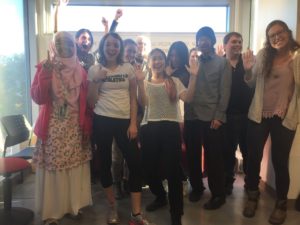
Extended Team 2016
Naomi Clark
Geoff Kaufman
Kate Adams
Matt Catlow
Nate Wooters
Evgeny Prozorov
Producto Studios
Hyperkinetic
Jared Segal
Our Collaborators, Connectors, and Funders!
Melanie Green
Sharyn Potter
Jane Stapleton
Ross Virginia
Geoff Kaufman
Trevor Owens
Brett Bobley
Perry Collins
Claire Knowles
Manish Mishra
Trish Rose-Sandler
William Ulate
Mike Lichtenberg
Petra Taylor
Our Awesome Student Team
Andrea Sedlacek
Ruba Iqbal
Nicole Chen
Jim Kehoe
Jaki Kimball
Spring Yu
Abby Livingston
Amanda Herz
Bineshii Hermes-Roach
Caitlyn Lee
Christine Qi
Abby Chen
Jesus Moreno
Jordan Hall
Shelley Garg
Nikita Shaiva
Savannah Liu
Partners, Liaisons, and Supporters:
The National Science Foundation
The Sloan Foundation
The Institute of Museum and Library Services
The National Endowment for the Humanities
The National Institute for Justice
Resonym Inc
Pub Services Inc
UncommonGoods.com
Amazon.com
ACD Distribution
Montshire Museum
Kickstarter friends
The Uncommons
IndieCade
Black Moon Games
Lebanon Salt Hill
Dartmouth of Institutional Diversity and Equity
Marbles the Brain Store
Special thanks also to Dartmouth College in general, and specifically: Amy Olson and the Office of Communications, The Neukom Institute, and the Dean’s Innovation Fund.
If we failed to name you specifically in this missive, we hope you know that you have our gratitude!

